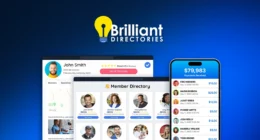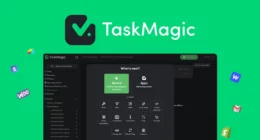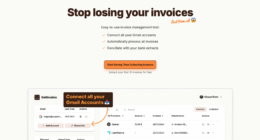Small businesses can leverage several reliable free expense tracking solutions to streamline their financial management. Popular options include TravelBank for unlimited receipt scanning, Zoho Expense for up to three users with mileage tracking, and Wave for extensive financial oversight. These tools offer essential features like mobile receipt capture, automatic categorization, and customizable reporting dashboards. While basic versions are free, choosing the right solution depends on specific business needs and security requirements. Understanding the full scope of available features helps maximize the benefits of expense management automation.
Quick Overview
- Zoho Expense offers free tracking for up to three users with features like mileage tracking and multi-currency support.
- Wave provides unlimited receipt uploads, comprehensive financial management, and user-friendly design at no cost.
- TravelBank delivers free unlimited receipt scanning with automatic expense categorization for streamlined business expense tracking.
- Free expense tracking tools can save businesses 15-30% on costs through real-time monitoring of unnecessary expenditures.
- Mobile capabilities enable instant receipt scanning, GPS mileage tracking, and automatic bank integration for efficient expense management.
Why Small Businesses Need Free Expense Tracking Tools

A small business owner’s filing cabinet, once stuffed with crumpled receipts and invoices, now sits empty thanks to modern expense tracking tools. These digital solutions have become essential for maintaining financial health and growth in today’s competitive market.
Free expense tracking tools offer small businesses critical advantages that directly impact their bottom line. By automating financial documentation, these systems reduce administrative workload by eliminating manual entry and organizing records efficiently. Most solutions provide basic receipt scanning capabilities that streamline expense documentation. They also help prevent costly errors in tax filing while maximizing potential deductions.
The real-time monitoring capabilities of these tools enable businesses to spot unnecessary expenditures, potentially saving 15-30% on costs. Additionally, the clear financial insights provided help owners make data-driven decisions, maintain compliance with regulations, and plan strategically for future growth.
Essential Features of Cost-Free Expense Management Software
Five essential features define effective cost-free expense management software for small businesses. These core functionalities help entrepreneurs maintain accurate financial records without straining their budget.
| Feature Category | Basic Functions | Business Benefits |
|---|---|---|
| Expense Categories | Auto-categorization | Better organization |
| Receipt Management | Mobile scanning | Paperless tracking |
| Reporting Tools | Custom dashboards | Data-driven decisions |
| Integrations | Accounting software sync | Streamlined workflow |
| User Access | Multi-user support | Team collaboration |
Free expense management solutions typically include automated categorization of expenses, mobile receipt scanning with OCR technology, and basic reporting capabilities. Most platforms offer cloud storage for receipt backups and support for multiple users, making team expense tracking efficient. Additionally, integration with popular accounting software facilitates seamless data flow between systems, reducing manual data entry and potential errors. Solutions like Zoho Expense provide free plans for teams of up to three users while maintaining essential tracking capabilities.
Top Free Expense Tracking Solutions in the Market
Leading expense tracking solutions available at no cost empower small businesses to manage their finances effectively without straining their budgets. Among the top contenders, TravelBank stands out with unlimited receipt scanning and automated categorization, while Zoho Expense offers robust features for up to three users, including mileage tracking and multi-currency support.
Wave provides thorough financial management with unlimited receipt uploads, while Expensify streamlines team reimbursements through its mobile app. QuickBooks Online, though primarily paid, delivers powerful expense tracking capabilities during trial periods. Each solution brings unique advantages: TravelBank excels in simplicity, Zoho in multi-user support, QuickBooks in accounting integration, Expensify in compliance management, and Wave in user-friendly design. These tools make professional expense tracking accessible to businesses of all sizes. Using these automated solutions can help businesses avoid the typical manual processing costs of $58 per expense report while improving accuracy.
Maximizing Mobile Capabilities for On-the-Go Expense Management
Modern mobile capabilities have revolutionized how small businesses handle their expense management, transforming time-consuming manual processes into streamlined digital workflows. These mobile solutions offer three key advantages for busy entrepreneurs:
- Real-time expense tracking with instant bank and credit card integration
- Smart receipt management using OCR technology for quick scanning and categorization
- GPS-enabled mileage tracking for accurate travel expense reporting
Mobile apps streamline expense workflows through:
- Automatic policy enforcement and approval processes
- Secure cloud storage for receipts and documentation
- Seamless integration with popular accounting software
For small business owners constantly on the move, these mobile capabilities guarantee accurate expense tracking while reducing administrative burden. The combination of real-time updates, automated features, and anywhere access makes mobile expense management an essential tool for modern business operations. Implementing a user-friendly expense app can significantly improve financial reporting accuracy while saving valuable time for business owners.
Security Considerations When Choosing Free Expense Software

Security vigilance remains paramount when selecting free expense tracking software for small businesses, particularly given the sensitive nature of financial data. Even with free solutions, businesses should verify essential security features:
Protecting financial data is non-negotiable, even when choosing free expense tracking tools. Security must drive software selection decisions.
- Strong encryption protocols (SSL/TLS) for data transmission
- Multi-factor authentication options
- Role-based access controls for team members
- Clear privacy policies explaining data handling
- Regular security updates and patches
Free software users should pay special attention to data privacy practices, ensuring the provider doesn’t compensate for free services by selling user data to third parties. While data security concerns are more prevalent in free solutions compared to paid alternatives, businesses can still find options that maintain industry-standard security certifications and offer robust cloud backup solutions. While free options may have limitations, they should never compromise on fundamental security measures like encrypted storage and secure login protocols.
Best Practices for Implementing Expense Tracking Systems
With a solid security foundation in place, successful implementation of expense tracking systems demands careful planning and systematic execution. Organizations should start by evaluating their current processes and setting clear, measurable goals that align with their overall financial strategy. Real-time monitoring capabilities enable organizations to maintain constant oversight of expenses and make proactive financial decisions. Popular solutions like QuickBooks integration make it easier to streamline accounting processes and maintain accurate financial records.
Key steps for effective implementation include:
- Selecting software that integrates smoothly with existing accounting systems
- Customizing expense categories and approval workflows to match business needs
- Providing thorough training through user-friendly resources
- Establishing clear policies for expense reporting and documentation
- Conducting regular system audits and collecting user feedback
Success depends on maintaining transparent communication throughout the process. Companies should monitor key metrics like processing times and error rates while remaining flexible enough to adjust their approach based on real-world results and employee feedback.
Frequently Asked Questions
Can Free Expense Tracking Software Handle Cryptocurrency Transactions and Digital Payments?
Free expense tracking software offers varying levels of support for cryptocurrency and digital payments. While crypto-specific platforms like CoinStats and Koinly provide extensive tracking across multiple blockchains and exchanges, general expense trackers may require manual entry for crypto transactions.
Digital payments through services like PayPal and Stripe are typically well-supported with automated integration. However, free versions often come with limitations on transaction volumes and advanced features.
What Happens to My Data if the Free Software Provider Discontinues Service?
What could be worse than losing years of financial records in an instant? When a free software provider discontinues service, stored data typically becomes inaccessible and may be permanently deleted. Users risk losing essential financial information unless they’ve taken preventive measures.
To protect data, businesses should:
- Regularly export and backup data
- Store copies in multiple locations
- Review provider’s data retention policies
- Maintain local backups of critical records
How Do Different Time Zones Affect Expense Tracking for International Teams?
Time zone differences create several challenges for international teams tracking expenses. Companies face issues with misaligned work schedules, delayed approvals, and inconsistent reporting deadlines. Team members may interpret submission cutoffs differently, leading to late or incomplete expense reports.
However, these challenges can be managed through cloud-based tools, automated reminders in local time zones, and clear global submission deadlines. Setting standardized processes helps maintain accuracy across different regions.
Are Machine Learning Capabilities Available in Free Expense Tracking Versions?
Yes, machine learning capabilities are available in free expense tracking versions, though with certain limitations. Basic ML features typically include receipt scanning with OCR technology and automated expense categorization.
However, advanced capabilities like predictive analytics and thorough fraud detection are usually reserved for paid versions. Free tools often provide enough ML functionality for basic expense management, making them suitable for users seeking essential automation without additional costs.
Can Free Expense Tracking Software Integrate With Point-Of-Sale (POS) Systems?
Yes, many free expense tracking software solutions offer POS system integration capabilities, though with some practical limitations. These tools can sync with popular POS systems like Square, Shopify, and Vend to automatically import transactions and track expenses.
While free versions typically provide basic integration features, they may restrict the number of transactions or supported POS systems. Solutions like Zoho Expense, Wave Accounting, and Expensify offer functional POS connectivity in their free tiers.
Conclusion
Like a well-oiled machine, free expense tracking software keeps small businesses running smoothly while protecting their bottom line. By choosing the right solution, implementing proper security measures, and following proven tracking practices, business owners can effectively manage their finances without breaking the bank. The abundance of quality free options means that even the smallest enterprises can access professional-grade expense management tools in today’s digital economy.








